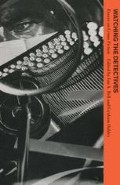Abstract
On 9 August 1846, Edgar Allan Poe wrote a grateful letter to his friend Philip Pendleton Cooke, in which he made a significant assessment of his own ‘ratiocinative’, or detective, tales:
Thank you for the compliments. Were I in a serious humor just now, I would tell you[,] frankly, how your words of appreciation make my nerves thrill — not because you praise me (for others have praised me more lavishly) but because I feel that you comprehend and discriminate. You are right about the hairsplitting of my French friend: — that is all done for effect. These tales of ratiocination owe their popularity to being something in a new key. I do not mean to say that they are not ingenious — but people think them more ingenious than they are — on account of their method and air of method. In ‘The Murders in the Rue Morgue’, for instance, where is the ingenuity of unravelling a web which you yourself (the author) have woven for the express purpose of unravelling? The reader is made to confound the ingenuity of the supposititious Dupin with that of the writer of the story.1
Access this chapter
Tax calculation will be finalised at checkout
Purchases are for personal use only
Preview
Unable to display preview. Download preview PDF.
Notes
John Ward Ostrom (ed.), The Letters of Edgar Allan Poe (Cambridge, Mass.: Harvard University Press, 1948) vol. ii, p. 328.
Edgar Allan Poe, The Narrative of Arthur Gordon Pym of Nantucket (1837), ed. Harold Beaver (Harmondsworth, Middx.: Penguin, 1975) p. 73.
J. Gerald Kennedy, ‘The Limits of Reason: Poe’s Deluded Detectives’, American Literature, 47 (1975–6) no. 2, pp. 184–96. Kennedy reads The Oblong Box’ as an ironic farewell to the tales of ratiocination, but his sense of Poe’s steady development from ‘a rage for order’ in the Dupin stories to a satire on that impulse seems too neat to be true.
Poe, ‘Hawthorne, Twice-Told Tales’, and ‘Tale-Writing: Nathaniel Hawthorne’, both in Eric W. Carlson (ed.), Introduction to Poe: A Thematic Reader (Glenview, Ill.: Scott, Foresman and Co., 1967) pp. 487, 488 and 495.
J. Lasley Dameron, ‘Poe’s C. Auguste Dupin’, Tennessee Philological Bulletin, 17 (1980) p. 6.
Collected Works of Edgar Allan Poe, ed. T. O. Mabbott (Cambridge, Mass.: Belknap Press, 1978). All further quotations from the tales and from Mabbott’s notes are from this edition (vol. ii for ‘The Murders in the Rue Morgue’, and vol. iii for ‘The Purloined Letter’).
As Richard Wilbur puts it: ‘We must understand “The Fall of the House of Usher” as a dream of the narrator’s, in which he leaves behind him the waking, physical world and journeys inward toward his moi intérieur, toward his inner and spiritual self. That inner and spiritual self is Roderick Usher.’ Quoted in Daniel Hoffman, Poe, Poe, Poe, Poe, Poe, Poe, Poe (London: Robson Books, 1973) p. 299.
My understanding of the narrator’s role has been influenced by James M. Cox, ‘Edgar Poe: Style as Pose’, in Dennis W. Eddings (ed.), The Naiad Voice: Essays on Poe’s Satiric Hoaxing (New York: Associated Faculty Press, 1983) pp. 53–6, and, to some extent, also, by Robert Giddings, ‘Was the Chevalier Left-handed? Poe’s Dupin Stories’, in A. Robert Lee (ed.), Edgar Allan Poe: The Design of Order (London and Totowa, NJ: Vision Press, 1987) pp. 88–111.
Julia A. Kushigian sees Dupin this way. Writing of ‘The Purloined Letter’, she claims: ‘Poe allows his detective to win and survive as a heroic figure.’ See ‘The Detective Story Genre in Poe and Borges’, Latin American Literary Review, vol. 11 (1983) p. 33; Susan F. Beegel, however, argues that Dupin’s ‘ratiocinative heroics are enfeebled by the overpowering presence of the irrational’. See ‘The Literary Histrio as Detective’, Massachusetts Studies in English, vol. 8 (1982) p. 7.
All three quotations are taken from David Brion Davis’s fascinating study. Homicide in American Fiction, 1798–1860 (Ithaca, NY: Cornell University Press, 1957) pp. 173, 175, 209. Davis does not examine ‘The Murders in the Rue Morgue’ specifically.
Mabbott, iii, p. 972; Ernest Mandel, Delightful Murder: A Social History of the Crime Story (London: Pluto Press, 1984) p. 19. But see also James M. Cox’s view, ‘Edgar Poe: Style as Pose’, p. 52.
This statement is my modification of Leonard W. Engel’s neat insight: ‘They have seen everything and have found nothing.’ See ‘Poe’s Tales of Ratiocination and his Use of the Enclosure’, Clues: A Journal of Detection, vol. 3 (1982) p. 84.
Stefano Tani noted this technique in his book The Doomed Detective: The Contribution of the Detective Novel to Post-Modern American and Italian Fiction (Carbondale, Ill.: Southern Illinois University Press, 1984) p. 9.
Harry Levin, The Power of Blackness: Hawthorne, Poe, Melville (New York: Alfred A. Knopf, 1970) pp. 141–2.
John Warrington, Everyman’s Classical Dictionary (London: J. M. Dent, 1961) pp. 86–7.
Editor information
Editors and Affiliations
Copyright information
© 1990 Ffrangcon C. Lewis
About this chapter
Cite this chapter
Lewis, F.C. (1990). Unravelling a Web: Writer versus Reader in Edgar Allan Poe’s Tales of Detection. In: Bell, I.A., Daldry, G. (eds) Watching the Detectives. Palgrave Macmillan, London. https://doi.org/10.1007/978-1-349-10591-5_7
Download citation
DOI: https://doi.org/10.1007/978-1-349-10591-5_7
Publisher Name: Palgrave Macmillan, London
Print ISBN: 978-1-349-10593-9
Online ISBN: 978-1-349-10591-5
eBook Packages: Palgrave Literature & Performing Arts CollectionLiterature, Cultural and Media Studies (R0)

